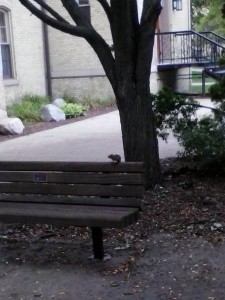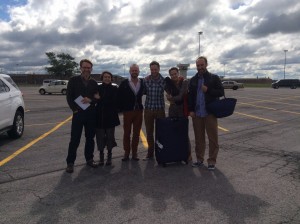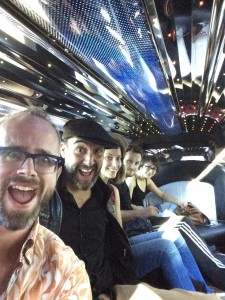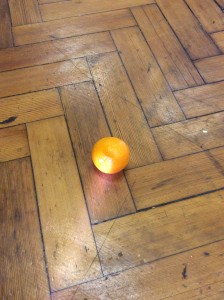As we come to the end of our stay in Notre Dame, we are all reflecting on what this work has meant to us so far. Apart from being the job on which most of us saw our first chipmunk.
Putting on a show of this nature with so few actors and no director has helped us to gain a better understanding of what we do in the rehearsal room. Where our strengths and weaknesses lie. If you only have yourself and your fellow actors to police your habits you really start to identify them. And we need to look at our process closely now because the other, very important, part of our work has come into play. The teaching. As we move around the USA, we will be teaching classes in the daytime to university students. These classes are not usually acting classes. They are on a range of subjects. We come into the room with our expertise, and use it as best we can to approach whatever topic we have been asked to approach.
I do not think of myself as a teacher. I think of myself as a practitioner. Not through aggressive self identifying. Just through a habitual contempt for bad teachers from my childhood. Here’s looking at you, Mr Wimbush. And through an unexamined lack of confidence in my ability to put things across. “What do I have to teach?” was my worry. “Oh shut up,” was Claire’s response. Which is what I love about actors. And was an entirely appropriate response.
The lovely thing is, we are not called upon to be the voice of the absolute. Just to share the things we have learnt. And we are, by our nature, eloquent people.
My first class was on Ethnomusicology and the oral tradition with Tala Jarjour. Eep. I was ridiculously nervous, and since all my students were anthropologists they were nervous too. We were on the stage in a massive theatre where I couldn’t work out how to put the lights on, and I was asking them to sing and improvise fairy stories. It was a great big nervous pie. But we ate it. And there was some tasty filling. I improvise in song in London all the time with The Factory. I love it and am getting quite good at it. But nerves are a stinker and I hadn’t been prepared for having to run the room.
Fortunately I had another class that day with Romana Huk, on Verse Drama. And this was in a non cavernous room with lights that I could work out how to switch on. And I knew I’d have to run the room so I did. Reflecting after the class I realised that, by teaching others, if you are open and honest, you teach yourself as well. I know a great deal more about the things I do unthinkingly now, having had to put them across to a room full of strangers.
My final class was Hamlet for English students with John Staud. He wanted them on their feet, so I did some acting work on them through the text. And helped a few of them to shift and be honest and confident while being watched by their peers. It was helpful having the perspective I’ve gained from doing an English degree myself. And having to explain how simultaneously helpful and unhelpful the academic perspective can be for an actor in practice. How my journey at drama school was away from it until I could hold on to the useful elements (quick study, no fear of sightreading etc) and abandon the less useful (endgaming, overweighting meaning etc)
By working practically with others, and speaking to them about my craft, it has already helped me chrystallise my understanding of that craft. And all five of us will be deepening that understanding as we tour and teach on a wealth of different topics across a wealth of different communities.
(By Al Barclay)






